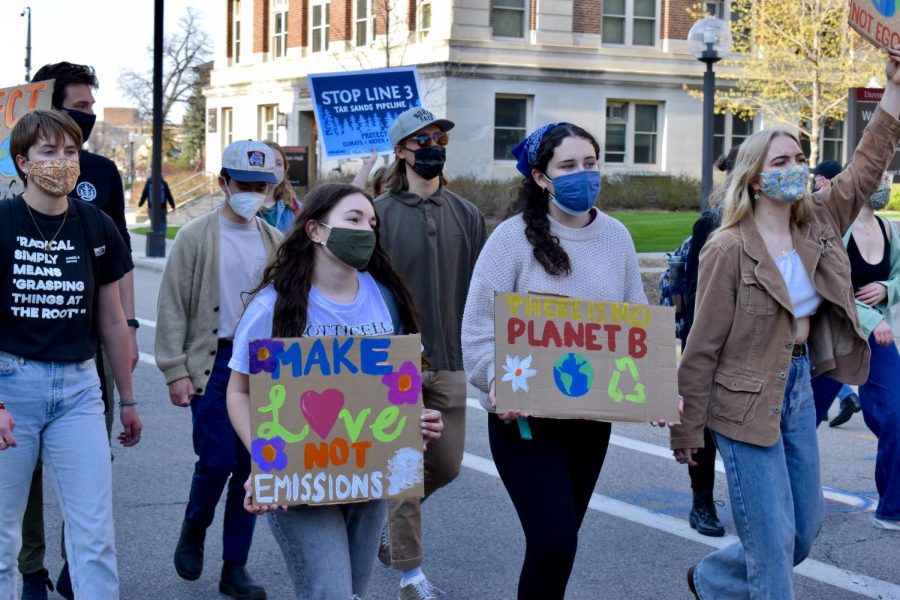Nearly 100 students gathered in front of Northrop Auditorium Thursday to celebrate Earth Day and bring attention to environmental racism in Minnesota and the Line 3 pipeline controversy.
UMN Students for Climate Justice and the Disabled Student Cultural Center, along with four other student groups, marched from Northrop to University Avenue Southeast and back. Speakers talked about their experiences with law enforcement during protests over the police killing of Daunte Wright in Brooklyn Center and their objection to the Line 3 pipeline.
Line 3 is a crude oil pipeline that the Minnesota Public Utilities Commission has approved to run across northern Minnesota. Since its proposal, many University community members have strongly opposed it.
Environmentalists and Indigenous communities have voiced concerns about the possibility of oil spills that would cause adverse health effects for tribal reservations above or near the pipeline.
The company building the pipeline, Enbridge, was responsible for one million gallons of oil spilled into the Kalamazoo River in 2010, making it the largest inland oil spill in the country.
Students marched and chanted, “We can’t drink oil!”
Emma Hjelle, a second-year student and organizer for UMN Students for Climate Justice, said that people with disabilities and people of color are typically left out of Earth Day events due to ignorance surrounding the intersection of environmentalism, race and class.
“For poor and underserved communities, it isn’t an option to consume these more expensive, more sustainable products,” she said. “And that’s not actually going to stop climate change as we know it.”
Jane Newby, a first-year student who spoke to the crowd, said environmental racism has played a key role in further oppressing communities of color.
Newby said industrial plants are often located in urban areas with high populations of people of color, creating negative health impacts and disparities between neighborhoods.
Black Minnesotans are six times more likely to test positive for asthma than white Minnesotans, according to Minnesota Center for Environmental Advocacy.
Maddie Miller, a third-year student studying political science, geography and environmental science, is the director of the Minnesota Student Association’s Environmental Accountability Committee and actively organizes against Line 3.
“It will destroy the environment, it harms Minnesota’s Indigenous communities, it exacerbates the epidemic,” Miller said.
Hjelle, the Students for Climate Justice organizer, said the responsibility to make a more sustainable world falls to large institutions like fossil fuel companies and organizations that support them, like the University of Minnesota.
“In a lot of ways, I think that Earth Day is a holiday that has been capitalized on and environmentalism and sustainability in general. There’s a lot of pressure on people to buy certain products and do certain things,” Hjelle said. “It’s so much greater than that.”


















